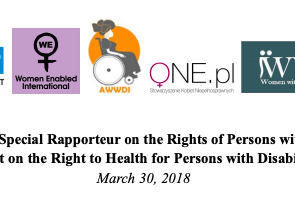Submission to Special Rapporteur on the Rights of Persons with Disabilities Report on the Right to Health for Persons with Disabilities

Submission to Special Rapporteur on the Rights of Persons with Disabilities Report on the Right to Health for Persons with Disabilities
March 30, 2018
By: Women Enabled International (Global), This-Ability Consulting (Kenya), AWWDI (Nigeria), LEDAP (Nigeria), ONE.pl (Poland), Women with Disabilities India Network (India)
Women and girls with disabilities around the world face violations of their right to the highest attainable standard of physical and mental health (right to health) that are unique from and disproportionate to other women and to men and boys with disabilities. In the context of sexual and reproductive health and rights (SRHR) in particular, women with disabilities encounter health facilities and information that are inaccessible to them, and they are forced to work with health personnel who are not trained to provide them care and are not aware of their rights. Due to stigma and discrimination about their sexuality and capabilities, women with disabilities may not be offered needed sexual and reproductive health information, goods, and services—such as contraception or comprehensive sexuality education—and are frequently subjected to medical interventions without their consent, including forced sterilization, abortion, and contraception. These health practices not only violate their right to health but also myriad other rights, including their rights to privacy, bodily integrity, to found a family, to be free from violence, and to be free from torture or ill-treatment.
This submission highlights some of the abuses women with disabilities face in the context of sexual and reproductive health care, with examples of laws, practices, and particular cases and studies in Kenya, Nigeria, Poland, and India. This submission first pulls out some of the elements of the right to health, including SRHR, that specifically impact women, including women with disabilities. The submission then seeks to respond to the Special Rapporteur’s questionnaire by providing background information and specific examples of the barriers women with disabilities face in accessing sexual and reproductive health care, the discrimination they encounter inside and outside the health care system that leads to violations of the right to health, and abuses they face in health care settings, based on denials of free and informed consent. The submission concludes with some recommendations to the Special Rapporteur for her forthcoming report and contains annexes with more detailed information about the specific contexts in Kenya, Nigeria, Poland, and India.
Downloads
PDF format downloads
DOC format downloads
PDF format downloads
- No files found
DOC format downloads
- No files found
PDF format downloads
- No files found
DOC format downloads
- No files found
PDF format downloads
- No files found
DOC format downloads
- No files found
PDF format downloads
DOC format downloads
PDF format downloads
- No files found
DOC format downloads
- No files found
PDF format downloads
- No files found
DOC format downloads
- No files found
PDF format downloads
- No files found
DOC format downloads
- No files found
